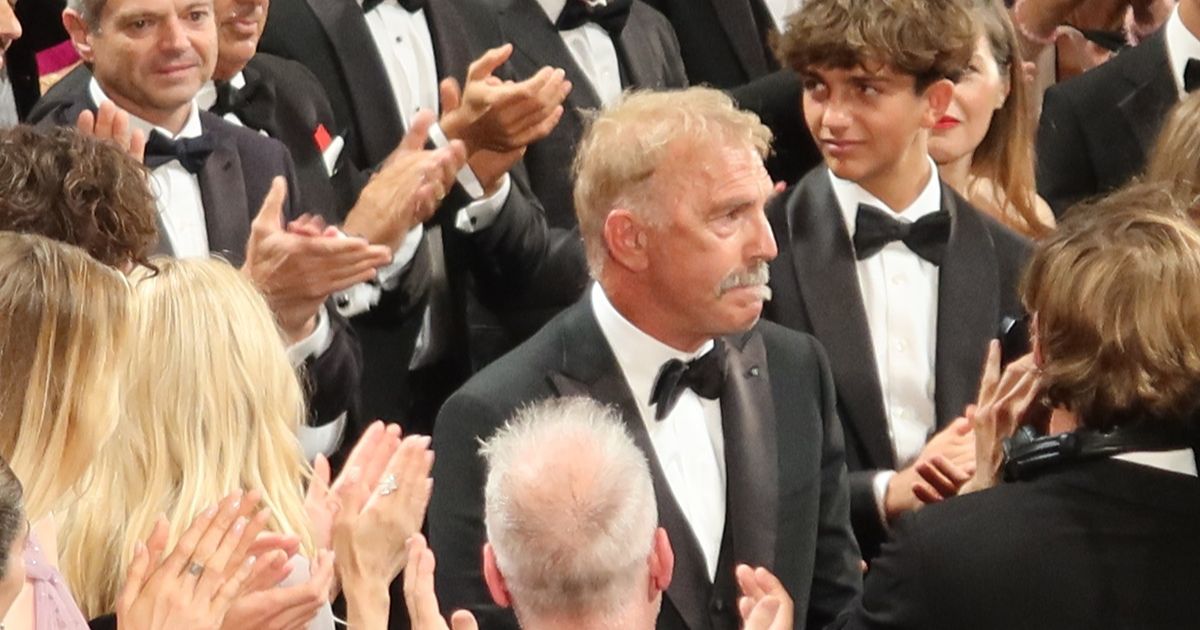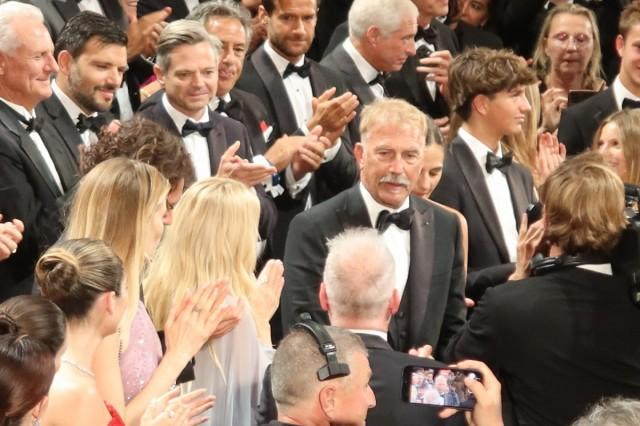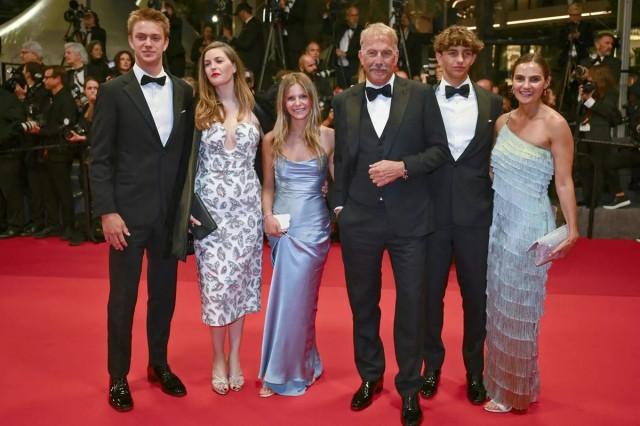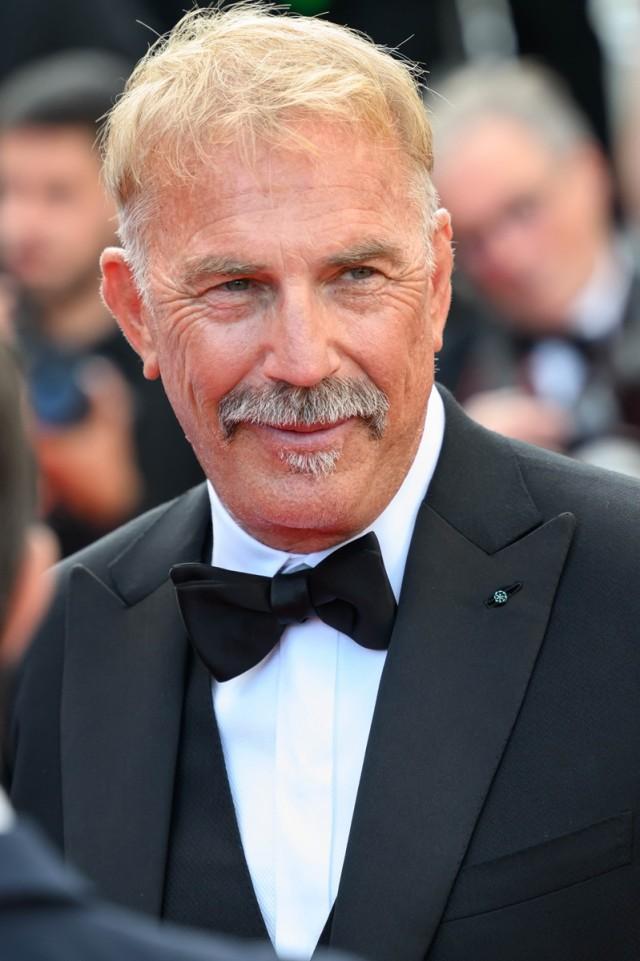Kevin Costner talks of his Western epic 'Horizon: An American Saga,' gets emotional at Cannes

When award-winning actor-filmmaker Kevin Costner premiered his Western epic, "Horizon: An American Saga" at the 77th annual Cannes Film Festival, he couldn't help but be emotional.
Not only did his drama got an enthusiastic 10-minute standing ovation from the crowd but he was also experiencing the memorable moment with his children in attendance - Cayden Wyatt Costner, Lily Costner, Grace Avery Costner, Hayes Costner and Annie Costner.
Wiping a tear away, the 69-year-old actor acknowledged the appreciative audience and remarked, "I would never forget this experience. Such good people. Such a good moment, not just for me, but for the actors who came with me, for people who believed in me, who continued to work.
"It's a funny business, and I'm so glad I found it. There's no place like here."
He continued, "I'll never forget this. Neither will my children (who were all seated with him). They all look so beautiful, dressed up so nice, the women, the men. They're so handsome."
A four-part Western epic, the first film had its world premiere in Cannes at the Out-of-Competition section. A passion project of Costner, the movie is told from the perspective of the cattle ranchers, farmers, soldiers as well as the Natives who lived there first.
Costner, who mortgaged his ranch, put his own money into the making of the $100 million-plus film.
The Academy and Golden Globe Award winner added, "I made this. It's not mine anymore. It's yours. I knew that the minute this was over and that's what it should be. I think movies aren't about their opening weekends. They're about their life and about how many times you're willing to share it."
"And I hope that you do share this movie with your sweethearts, with your children. I feel so lucky. I feel so blessed — and there are three more.
"There was no reason that this was going to happen, and it's just another miracle in my life. Thank you so much for giving me your precious time. I hope that this time was worth it for you. Thank you."
Manila-based production outfit Parallax Studio and entertainment company Saga Film Studios have formed a joint venture that will distribute "Horizon: An American Saga" in the Philippines.
In an interview, Wesley Villarica of Parallax Studio said, "When we heard that these films were being offered, we had to jump at the chance to acquire them. It's not every day that films like these come around. And coming from Kevin Costner, we're sure they'd be top-quality films."
Jessel Monteverde of Saga Film Studios added in the interview, "These are the types of films that would look great on the big screen. Cinematic landscapes, thrilling chases on horseback, gunfights. It's an adventure. Something you'd go to the theaters to experience."
We were able to interview Costner at the Cannes Film Festival at the press conference.

I just want to come back on this image that I saw of you yesterday, after the screening. You look so moved, you look so touched, and you've been in this adventure for 35 years now. There were many obstacles, and it was a difficult journey. What came through your mind yesterday when people were standing and applauding as they were?
My feeling is that I will hope someday that you have a feeling like I had last night. It was a remarkable moment for me. I found myself going back in time as I looked at the people. They gave me such joy and I felt so much love and I didn't expect it. I started to walk my life backward, thinking how in the world did I get here? How in the world did this night end up like this? And the idea that my children were there watching was very special for me.
How much research did you do to write such a complex epic? Beyond your imagination, which books, films, and maps were required to write this story?
It required a lot of research because it comes from paintings. Luckily, the camera was back in the 1800s so I was able to use black and white for my costumes. Costumes are always really important to me. But the different books, they're numerous. All my life I've read about this time, so I just drew on everything.
Do you realize the power that you have in people? And also, if you could tell the story that you named your son after one of the characters of this movie?
This started for me in 1988 and there was the character, Hayes. I have this worldwide fame, but if you can drop that for a second. I have trouble with my children, I have trouble with everything. I had trouble making this movie, but for whatever reason, I kept the name Hayes.
It was part of my journey, I wasn't going to let go of this character, Hayes Ellison. So, I started this in 1988 and I couldn't meet it. But I wouldn't fall out of love with it. I couldn't make it, but I wouldn't fall out of love with it. I don't know what that says about me, but I couldn't fall out of love with Hayes. So15 years ago, I named my son Hayes because I couldn't let go of it. Then all of a sudden, I put him in the movie. That was the little boy. The little boy who would not leave his father is my son. He'd never acted before. I don't automatically give parts to my children because I know how coveted this is. Some young people would do anything to have a part in a movie. I want those kids to emerge.
My children, if they're not interested in the business, I'm not going to automatically give them something. Because I know there are other people that this is a dream for them. But I'm also a father. It was a part that wasn't that long. I wanted him to be close to me. I was away from home. I needed my family close to me. It was a way for me to trap him and have him close to me. I thought he was just beautiful in the movie.
So, you had this idea that he wouldn't go, and you admired it. But then there's a third element; Once you get past that, you realize he made a mistake, a fatal mistake, in that one decision. That's what appeals to me about western movies. You create the right architecture for a scene. We tend to think of Westerns as simple. They are not simple, they're complicated.
Living in Cannes, Paris, and Los Angeles is simple. It's not that you don't have trouble. People have trouble in every decade, every century. But the West was complicated. You had people who didn't share a language, who were at odds with each other, there were guns, and there was no law. Try to live in that kind of environment and see how simple it is. So, when Hollywood makes simple Westerns, they're not appealing to me. They need to have a level of complication. Something has to be at stake and it's hard to write a good Western. I don't know if I wrote a good one.
I wrote the best Western with Jon Baird that I could write that had a level of compassion and humor. Would it translate? I didn't know. I wrote a Western with Jon Baird that included women as being the biggest part characters in the movie. It made sense to me. Of course, I'm going to have gunfights. I'm going to have the things that Westerns are known for. But I'm going to also have a scene about a woman from the rules of the West, who just felt so dirty that she wanted to put warm water on herself to clean herself, to just be clean, to feel the idea of being clean.
There are a lot of people that would say, you can't have that scene. We don't need that scene. What's that scene doing in a Western? Well, it seems to be the most logical of scenes that would be in a Western. How did these people clean themselves in this environment of constant dirt, of constant dust? Is she any different than you? She's not. And that's why I think those kinds of scenes should be in a movie. Movies have to have something in common with you or you lose track of what you're watching in the dark and go who the fuck is this? It's when we recognize ourselves is when we can create moments that we'll never forget.

I don't know why it was so hard to get people to believe in the movie that I wanted to make. I've made movies before. I don't think my movie is better than anybody else's movie, but I don't think anybody else's movie is better than mine. I make it for people. So, it's a pattern for me.
It's happened with Dances with Wolves, Field of Dreams, Bull Durham, Open Range. It seems to be a pattern that some of the things that I like are harder to make.
My problem is that I don't fall out of love with what I think is something good. I try to go the traditional way. I look at this harbor and there's so many boats out here and there's so many billionaires. I feel like I should come to Cannes, I should come to Monaco and say, hey billionaire, do you want to be in the movie business? Because I have four Westerns and what will come back is, 'Well, why should I invest in a movie when maybe the studios don't?' That's a very good question. That's a very good answer. But all I can say is, I believe in it. I believe that when these lights go out and we're in a movie theater, something magical can happen. A curtain can open.
In America, I don't know any theaters that have curtains anymore. As a child, I loved that. So, part of why I wanted to make 1, 2, 3, and 4 was to make it for myself. Because I know what it's like to sit out there in the audience and the curtain opens and something magical is going to happen. A story is going to transport us. It's going to take us to a place and pretty soon we have to leave the theater. Not before three hours. We'll stay there for three hours together. Not always. Then we have to go do our jobs. We have to go get our kids at school. We have to go have a chance at magic, something that we'll never forget.
I have made the second one already. I filmed it. Now I'm trying to make the third one, and I've knocked on every boat in Cannes to help me. They, ooh, come, want to have a picture. I said, no, come get your checkbook out. I want to see, let's talk about money. I'm by myself a lot. What I have is I've had good luck in my life, and I've acquired some things, land, some homes that are important to me and they're valuable, but I don't need four homes, like anyone. I will risk those homes to make my movies.
I wish I didn't do it because I want to leave those homes to my children. But my children will have to live their own life. If I have not made a mistake, they'll still maybe have these four homes. If I've made a mistake, I'll say, you have to live your own life. I've lived mine and I'm really happy. I will have to figure out with my friends, with the things I own, how do I make three to bring this back here. I would like to come back here for the third movie. Cannes has been a partner to me.
This film festival might be a good place to come socially, to have drinks, to meet people, to meet girls, to meet boys, whatever. But for me, Cannes helped give my movie life.
From about 1990, Dances with Wolves, to today, what have you learned about yourself and about the making of Westerns that made this so different? Why is Horizon so different than Dances with Wolves? What is your obsession with the West? Why did you feel that you wanted to have more of a representation?
You asked about what's the difference between Dances and Horizon. For me, there's no difference, but for you perhaps there's a difference. I believe that the Native Americans in Dances with Wolves should be very well-rounded people. I didn't think I was breaking ground. It's just the way I wanted to see them. It made my story better, to me. Before I gave you the story, I decided it needed to be good for me. I've brought every trick I can. I shot Dances with Wolves for 106 days. I shot the movie you saw, that's arguably bigger, in 52 days. It was my money, it was my partner's money, and I was trying not to waste it, but I was trying to not shortchange you on anything that I thought should be in there. The West, you notice the West is very heavily in women in our movie.
African Americans, Glynn Turman comes in number two, and an actor that I desperately want will come into three and four and ultimately end up being the first mayor of the town. I'm conscious of race. I lived in a place called Compton, California. I funded a movie called Black or White. It was my version of a level of racism that exists in our country, Compton, and Beverly Hills. So, I can't fill every box every time I try to make a movie, but I'm conscious of what's at stake and trying to represent people. And the Chinese were a very important part, and they were, and African Americans began to populate the West. So, they're important to me and I probably fail and succeed at every turn, but my aim is true.
I would like to ask you about the excellent choreography of the characters and also the idea of the frontier that somehow is inside the deepest core of this film, the frontier, the horizon, something that is so unique in American history, dramas, and the environment.
America 200 or 300 years ago, was kind of like the Garden of Eden. You had Europe, you had the rest of the world, and there were people here that were starting to hear stories, that if they could get across this ocean safely, and who's to say that trip was even going to be safe? Did you take a look at the boats that went from here to there? Would you do that? But people who wanted a new life would.
They would risk everything to go to this place that didn't even have a name. It was kind of a myth, and it was a myth. Come to this place, there's 90 million buffalo. Come to this place, you'll never see a building. It was true. You have Europe, you have Africa, and you have the Middle East where civilization began. Big buildings. And you go to America, there was nothing there.
The idea of the horizon that's out in front of people was a myth. People tried to explain it to other people. You can go to this place and if you're strong enough, you're mean enough, you're tough enough and you're resourceful enough, you can carve out a life for yourself. There were so many people in Europe who just looked at their wives and said, we need to go there. We're going to be third-class citizens under this monarchy or under this kingdom or whatever it was. This great movement came to America.
There was some kind of promise. But the reality was, though, this land that if you were smart enough and you were mean enough that you could take, you'd be taking it against people who have been there for 15,000 years. We had a consistent march across America where we destroyed over 500 cultures. We had the same thing in our history called slavery.
The world was working that way, and we've still not recovered from that or that war, that civil war. The only reason the West lasted as long as it did was because of the civil war. They were busy fighting and at that point, there was no army out there to protect all these immigrants that were moving West. There are small forts, like what I show, that if you listen to the language carefully, the lieutenant says, you know, only 40, 50 people attacked this town. There are probably 3,000 others that didn't touch this thing at all, and if we're not careful, they'll rid us of a day's work. I hope you revisit Horizon, because words are important to me. I like gunfights too. I like them. But I like language that identifies things.
So, the idea of Horizon - it's kind of nice to know that you preserve the heritage of buildings here, sacred. In America, we have a lot of land, and it just got gobbled up. I appreciate that in America we're starting to value land for other generations to go look at. This movie, hopefully, is a postcard when you see those locations. They do exist. These rivers run. These mountains have never moved and never will. It's important sometimes to just not build there and let future generations see. There are two great scenes in Horizon. I came back a year later shooting two. There are warehouses there. But not in the movie. It's there forever. That's what movies can do too, is preserve a way of life.

I love the dreaming part of movies and the writing of them. I love what happened last night. I love seeing my children dressed up. I love seeing other people dressed up. The red carpet is an incredible thing, but if you're only in the movies for the red carpet, for the glamour of it, for whatever that comes with the fame, I had the most beautiful room and I really appreciate it. But I like to think I got to this place because I like the work. I like the dreaming part. I like late nights, directing, editing and writing. I like that part of it the best.
When you're working like crazy on the set and it's really difficult. Do you prefer that to the red carpet?
Sometimes I used to get no money to do this. Then I used to get a lot of money to do this. Now I have to pay my own money to do this. (laughter) But the thing that happens, and I swear to you, I don't think I've ever said this at a thing, I have a thing that almost happens to me every morning or every day at work.
There's one moment where I feel like I solved something, and I'm so happy and I think you earned your money today. Because I can just repeat myself all day long, but sometimes there's a problem that needs to be solved, and I solved it today. When that happens, when I find a moment, or I help another actor find a moment, or I move the scene to a different spot it's more beautiful. I feel like I earned my dough. I earned it. It's not casual for me when I'm out there. My attention is all over the place.
Where are you now in terms of filming? Are you done with number two? You shot it and you're gonna start shooting number three?
I shot three days of film three, believe it or not before I came here. I shut my movie down, which is unheard of, to come here. It was so important for me to come to a place where movies are viewed in a very open way. This was important to me, to be here. I'm going to leave here, and I'm going to go back and start directing again and go as far as my money takes me.
I'm thinking that if we all went out together into this harbor and we stood in front of one boat and didn't let those rich people off. We can tell them, look, you can dress up, you can walk on the red carpet. Look, this is my journey. It is hard. But I feel lucky to have found this business. It's part of my journey, this struggle. But I'm not struggling anymore about chapter one. It's out there. I did my best. It's done.
And two, I'm doing my best, and it will be done. And that's all we can do. And being an actor, being famous, that may be how you look at me, but it's not how I look at me.
I have children who are succeeding in school, succeeding in their school plays. I still watch the little ones at Christmas time and when they don't know the words, help them sing them. Rudolph the Red, get your hands up, hear the horns, Red-Nosed Reindeer. And I'm, like every other parent, sitting in the front row, recording everything. We are connected, and I'm never going to forget that, and you shouldn't either.
—MGP, GMA Integrated News



